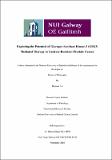| dc.description.abstract | Glycogen Synthase Kinase 3 (GSK3) is involved in a myriad of signalling pathways and has recently received considerable interest due to its conflicting roles tumourigenesis. Though it has classically been regarded as a tumour suppressor, emerging evidence suggests that GSK3 it is also a tumour promoter. One of GSK3’s tumour promoting properties has been linked to its ability to inhibit the death receptor mediated apoptosis (the extrinsic apoptotic pathway) by regulating NFκB signalling, which is constitutively active in castrate-resistant prostate cancer (CRPC). Targeting GSK3 has been shown to reduce NFκB activity and the expression of some of its associated anti-apoptotic proteins, thus sensitising tumour cells to the cytotoxic effects of death receptor ligands such as TNFα, whose circulating levels are increased in CRPC. In this study we sought to determine if GSK3 regulates NFκB signalling in CRPC and whether targeting it can sensitise CRPC cells to the cytotoxic effects of TNFα.
Our findings show that NFκB and GSK3 are active and up-regulated in CRPC cell lines (DU145 and PC3) compared to normal prostate epithelial cells (RWPE-1) and androgen-dependent prostate cancer cell lines (LNCaP and MDA-PCa2b). Treatment of the CRPC cell lines with the pan-GSK3 inhibitor CHIR99021 (CHIR) reduced NFκB activity, the expression anti-apoptotic proteins and IL-6 secretion. Furthermore, CHIR also sensitised the normally TNFα-apoptosis resistant CRPC cell lines to TNFα-induced apoptosis. Using an RNAi based approach, siRNA directed against each of the two GSK3 isoforms, GSK3α and GSKβ, confirmed the effects of CHIR as being GSK3 mediated and allowed us to identify the role of each isoform in relation to regulating NFκB signalling in CRPC. Although the knockdown of either GSK3 isoform didn’t affect the phosphorylation or nuclear translocation of the NFκB RelA subunit, there was a marked reduction in NFκB activity and RelA-DNA binding, suggesting that both GSK3 isoforms regulate NFκB signalling at a nuclear level in CRPC. In order to ascertain whether the reduction in both NFκB activity and RelA-DNA binding following the knockdown of either GSK3 isoform was due to elevated β-catenin arising from reduced GSK3, treatment with the β-catenin inhibitor JW67 restored NFκB activity in both CRPC cell lines. Although treatment with JW67 restored RelA-DNA binding in PC3 cells, it didn’t restore it in DU145 cells, suggesting that GSK3 regulates NFκB signalling in CRPC in a β-dependent and independent manner.
Taxanes, the current standard of care for CRPC, are fraught with problems relating to chemo-resistance and selectivity. NFκB signalling is thought to be a key mediator of taxane-resistance in CRPC. Using paclitaxel-resistant variants of the CRPC cell lines, PC3-TX-R and DU145-TX-R, we showed that NFκB activity is increased in these cells compared to their respective parental cell lines. Whereas increasing NFκB activity by overexpressing RelA was shown to be insufficient to induce paclitaxel resistance in DU145 cells, targeting NFκB using the NFκB activation inhibitor BMS-345541 was shown to re-sensitise the paclitaxel-resistance cells to paclitaxel. In addition, targeting either GSK3 isoform was also shown to reduce NFκB activity in the paclitaxel-resistant variants and re-sensitise them to paclitaxel, suggesting that targeting a single GSK3 isoform is sufficient to overcome taxane-resistance in CRPC. Furthermore, as a possible alternative to taxane-based chemotherapy, targeting either GSK3 isoform was also shown to sensitise the paclitaxel-resistant CRPC cells to TNFα-induced apoptosis. Finally, to assess the specificity of sensitising CRPC cells to TNFα cytotoxicity in this GSK3 targeted manner, primary prostate epithelial cells pre-treated with CHIR weren’t sensitised to TNFα-induced apoptosis, suggesting some degree of specificity for targeting CRPC tumour cells in this manner. Collectively, our findings warrant further research into the use of GSK3 inhibitors for the treatment of CRPC. | en_IE |


